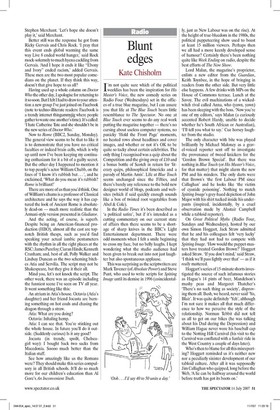Blunt edges
Kate Chisholm T 'm not quite sure which of the political weeklies has been the inspiration for His Master's Voice, the new comedy series on Radio Four (Wednesdays) set in the offices of a true blue magazine, but I can assure you that life at The Blue Touch bears little resemblance to The Spectator. No one at Blue Touch ever seems to do any real work putting the magazine together — there's no cursing about useless computer systems, no panicky 'Hold the Front Page' moments, no heated rows about headlines and cover images, and whether or not it's OK to be quite so tacky about certain celebrities. The only thing I recognised was a quip about the Competition and the giving away of £10 and a bonus bottle of Scotch in return for 'literary quips, philosophical limericks and a parody of Martin Amis'. Life at Blue Touch seems unchanged since the Fifties, and there's barely any reference to the bold new designer world of blogs, podcasts and websites (which if said quickly enough sounds like a box of twisted root vegetables from Abel & Cole).
In the Radio Times it's been described as 'a political satire', but if it's intended as a cutting commentary on our current state of affairs then there seems to be a shortage of sharp knives in the BBC's Light Entertainment department. There were odd moments when I felt a smile beginning to cross my face, but no belly laughs. I kept wondering what the studio audience had been given to break out into not just laughter but also spontaneous applause.
This was surprising as the scriptwriters are Mark Tavener (of Absolute Power) and Steve Punt, who used to write scripts for Spitting Image until its demise in 1996 (coincidentally, just as New Labour was on the rise). At the height of true-bluedom in the 1980s, the political puppeteering show used to boast at least 15 million viewers. Perhaps then we all had a more keenly developed sense of humour? Certainly there's been nothing quite like Week Ending on radio, despite the best efforts of The Now Show.
Lord Malan, the magazine's proprietor, enlists a new editor from the Guardian, Keith Toynbee, in the hope of bringing in readers from the other side. But very little else happens. A few drinks with MPs on the House of Commons terrace. Lunch at the Savoy. The evil machinations of a wickedwitch rival called Anna, who (yawn, yawn) has been sleeping with the boss. 'Now you're one of my editors,' says Malan (a curiously accented Robert Hardy, unable to decide whether he's South African or Australian), 'I'll tell you what to say.' Cue horsey laughter from the studio.
The only character with bite was played brilliantly by Michael Maloney as a gravel-voiced reporter sent off to investigate the provenance of tweed knickers for the 'Gordon Brown Special'. But there was nothing in Blue Touch (or His Master's Voice, for that matter) that might alarm the new PM and his minders. The only darts were that Brown's `the first Labour PM since Callaghan' and he looks like `the victim of cyanide poisoning'. Nothing to match Spitting Image's grey-hued depiction of John Major with his shirt tucked inside his underpants (inspired, incidentally, by a cruel observation made by Alastair Campbell while a tabloid reporter).
On Great Political Myths (Radio Four, Sundays and Wednesdays), hosted by our own Simon Hoggart, Jack Straw admitted that he and his colleagues felt 'very lucky' that they had not had to compete with Spitting Image. 'How would the puppet-masters have treated Gordon Brown?' Hoggart asked Straw. `If you don't mind,' said Straw, 'I think we'll pass lightly over that' — as if it really mattered.
Hoggart's series of 15-minute shorts investigated the source of such infamous stories as Hague's 14 pints of beer, Mandelson's mushy peas and Margaret Thatcher's 'There's no such thing as society', disproving them all. Bush, we heard, never said 'Yo, Blair'. It was quite definitely 'Yeh', although I'm not sure it makes all that much difference to how we perceive the style of the relationship. Norman Tebbit did not tell us all to get on our bikes (he was talking about his Dad during the Depression) and William Hague never wore his baseball cap to the Notting Hill Carnival (his visit to the Carnival was conflated with a funfair ride in the West Country a couple of days later).
Who's then to blame for all this misreporting? Hoggart reminded us it's neither new nor a peculiarly sinister development of our tabloid culture. After all it was supposedly Jim Callaghan who quipped, long before the Web, 'A lie can be halfway around the world before truth has got its boots on.'

















































 Previous page
Previous page